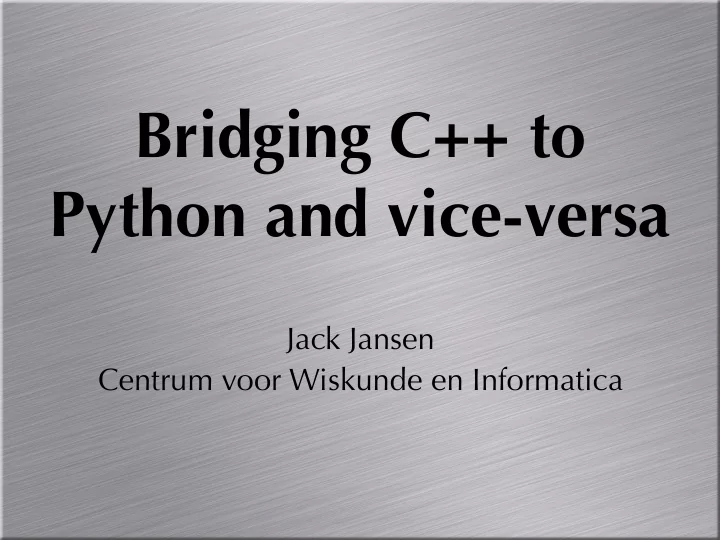

Bridging C++ to Python and vice-versa Jack Jansen Centrum voor Wiskunde en Informatica
About Me Active Python user since 1992, “responsible” for MacPython since 1995, when Guido got rid of his Mac. Work at CWI on multimedia research. Also: father, bass player, long time Unix devotee, punkrocker, hiker, party animal, anarchist, etc
About the Talk Problem definition Python and C++ Object models Bgen Extending bgen for C++ Closing remarks
Defining the Problem We have: extensible multimedia playback framework in C++ We want: extensible multimedia playback framework in Python It makes experimenting sooooo much easier... Therefore: 2-way cross-language calling and subclassing
Ambulant Goals Extensible multimedia playback engine in C++ (but you knew that already:-) Targeted at research/development Portable (Linux, Win32, WinCE, Mac) High-performance ALL components replaceable and extensible
Ambulant Design Parser DOM tree Single instances Layout Scheduler Manager independent Machine Multiple instances Datasource Playable Renderer Surface Datasource Playable Renderer Playable dependent Machine GUI window
Sample API /// Determine where to render media items. /// The layout_manager manages the mapping of media items to regions. class layout_manager { public: virtual ~layout_manager() {}; /// Return the surface on which the given node should be rendered. virtual surface *get_surface(const lib::node *node) = 0; /// Returns the image alignment parameters for the given node. virtual alignment *get_alignment(const lib::node *node) = 0; /// Return the object that will receive notifications when the given node is animated. virtual animation_notification *get_animation_notification(const lib::node *node) = 0; /// Return the object that the animator will control for the given node. virtual animation_destination *get_animation_destination(const lib::node *node) = 0; };
C++ Object Model Pure virtual classes are really interfaces Overloading of methods (and constructors) by argument signature Not needed, yet: Operators exceptions templates
Python Object Model PEP252 and PEP253 are the definitive reference 3-step creation with: tp_alloc(type) to allocate storage tp_new(type, args) to create blank object tp_init(obj, args) to initialize object Allows 2-way subclassing between Python and C
obj = MyType() To create an object: call its type ( tp_call on its metatype) PyType_Type.tp_call first calls MyType.tp_new(MyType, args) then obj.tp_init(args) MyType.tp_new calls MyType.tp_alloc All calls through the normal inheritance scheme
The Problem Revisited Python object implementation that has reference to C++ object, tp_new calls constructor, method calls forwarded C++ class that implements interface, has PyObject pointer, constructor does tp_new / tp_init dance, method calls forwarded Glue between the two
Bridging C++ to Python Hand-coded is not an option even with Pyrex Swig is gruesome Lots of Python glue, generated code unreadable difficult debugging Boost is huge SIP?
Bgen history Written by Guido, maintained by me for 10+ years Builds Python interfaces to Mac toolbox modules (Quicktime, Carbon, CoreFoundation) parses 100K lines of C header files generates 30 modules containing 3000 methods (85K lines of C) and 10K constants
Bgen Control Flow Parse .h file with set of foo.h RE’s Transform arguments to fooscan.py Parse be more pythonesque RE's and rules const char *buf, int size becomes Filter Python string Filter methods and foogen.py functions by argument signature foosupport.py Type Generate code declarations and
Bgen Sample EXTERN_API( void ) HideDialogItem( DialogRef theDialog, DialogItemIndex itemNo) ONEWORDINLINE(0xA827); EXTERN_API( Boolean ) IsDialogEvent(const EventRecord * theEvent) ONEWORDINLINE(0xA97F); f = Method(void, 'HideDialogItem', (DialogRef, 'theDialog', InMode), (DialogItemIndex, 'itemNo', InMode), ) methods.append(f) f = Function(Boolean, 'IsDialogEvent', (EventRecord_ptr, 'theEvent', InMode), ) functions.append(f)
Bgen Control Flow - 2 fooscan.py Parse RE's and rules Filter Intermediate output is Python code foogen.py Supply “type declarations” to foosupport.py handle argument Type Generate code declarations and conversion glue Generate code foomodule.c
Bgen Sample Output static PyObject *DlgObj_HideDialogItem(DialogObject *_self, PyObject *_args) { PyObject *_res = NULL; DialogItemIndex itemNo; if (!PyArg_ParseTuple(_args, "h", &itemNo)) return NULL; HideDialogItem(_self->ob_itself, itemNo); Py_INCREF(Py_None); _res = Py_None; return _res; } static PyObject *Dlg_IsDialogEvent(PyObject *_self, PyObject *_args) { PyObject *_res = NULL; Boolean _rv; EventRecord theEvent; if (!PyArg_ParseTuple(_args, "O&", PyMac_GetEventRecord, &theEvent)) return NULL; _rv = IsDialogEvent(&theEvent); _res = Py_BuildValue("b", _rv); return _res; }
Bgen Parser for C++ Better parser: classes, namespaces, inline functions, default arguments, ... But still doable with RE’s! No need to filter methods/functions, C++ has real classes
Overloading Need to handle name overloading Only for constructors, today if (PyArg_Parse(_args, “i”, &ival)) { // body for method(int ival) } else if (PyArg_Parse(_args, “s”, &sval) { // body for method(const char *sval) }
C++ to Python Simply rerun intermediate Python code with completely different generators! Argument handling and return value handling more-or-less reversed
Future Work Bgen really needs a makeover Packages exist since Python 1.5 or so:-) Visitor paradigm seems very useful Distutils-based? “Interactive” RE generation? Volunteers? Bridging exceptions, operators
Questions?
Recommend
More recommend